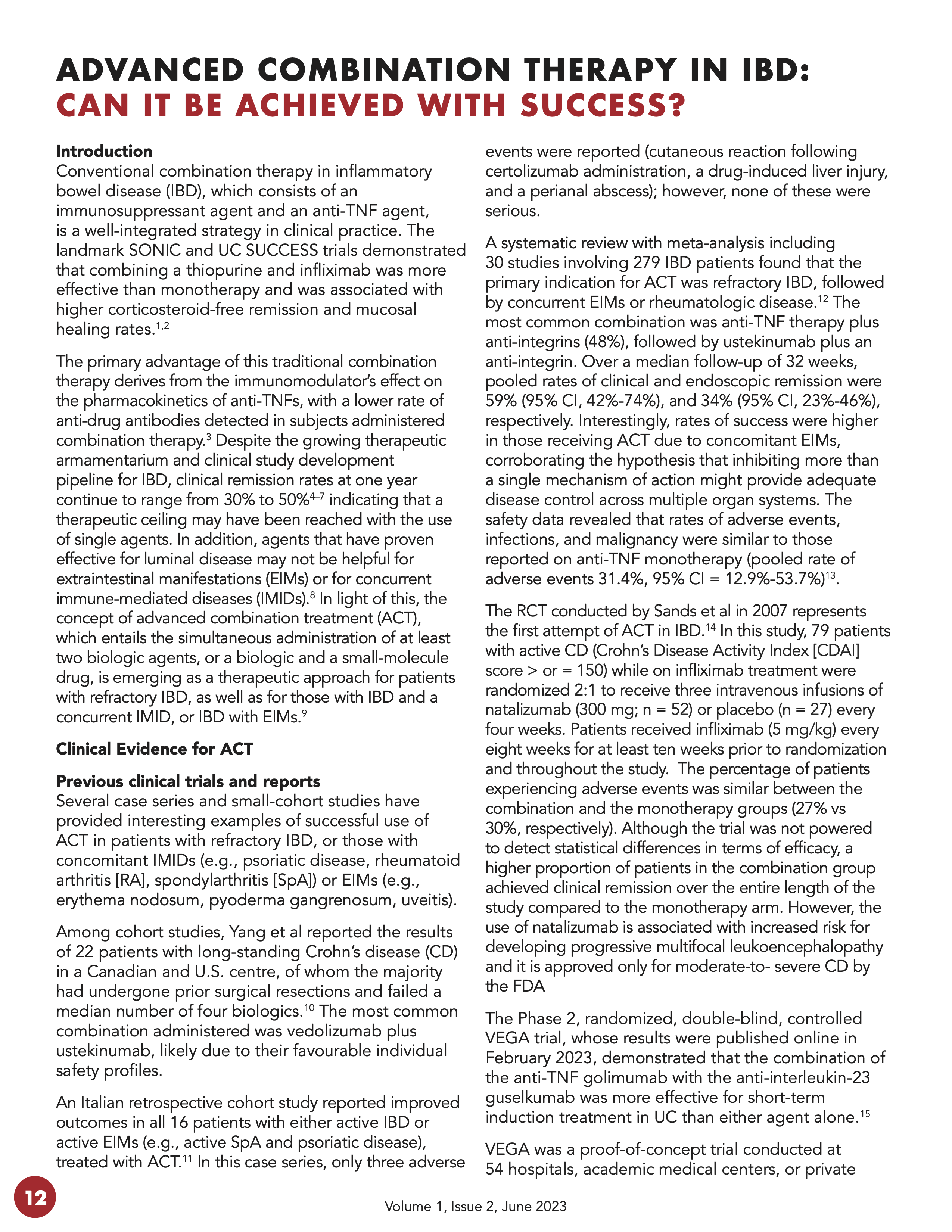Advanced Combination Therapy in IBD
Can it Be Achieved With Success?
DOI:
https://doi.org/10.58931/cibdt.2023.1212Abstract
Conventional combination therapy in inflammatory bowel disease (IBD), which consists of an immunosuppressant agent and an anti-TNF agent, is a well-integrated strategy in clinical practice. The landmark SONIC and UC SUCCESS trials demonstrated that combining a thiopurine and infliximab was more effective than monotherapy and was associated with higher corticosteroid-free remission and mucosal healing rates. The primary advantage of this traditional combination therapy derives from the immunomodulator’s effect on the pharmacokinetics of anti-TNFs, with a lower rate of anti-drug antibodies detected in subjects administered combination therapy. Despite the growing therapeutic armamentarium and clinical study development pipeline for IBD, clinical remission rates at one year continue to range from 30% to 50%, indicating that a therapeutic ceiling may have been reached with the use of single agents. In addition, agents that have proven effective for luminal disease may not be helpful for extraintestinal manifestations (EIMs) or for concurrent immune-mediated diseases (IMIDs). In light of this, the concept of advanced combination treatment (ACT), which entails the simultaneous administration of at least two biologic agents, or a biologic and a small-molecule drug, is emerging as a therapeutic approach for patients with refractory IBD, as well as for those with IBD and a concurrent IMID, or IBD with EIMs.
References
Colombel JF, Sandborn WJ, Reinisch W, et al. Infliximab, Azathioprine, or Combination Therapy for Crohn’s Disease. N Engl J Med. 2010;362(15):1383-1395. doi:10.1056/NEJMOA0904492 DOI: https://doi.org/10.1056/NEJMoa0904492
Panaccione R, Ghosh S, Middleton S, et al. Combination therapy with infliximab and azathioprine is superior to monotherapy with either agent in ulcerative colitis. Gastroenterology. 2014;146(2). doi:10.1053/J.GASTRO.2013.10.052 DOI: https://doi.org/10.1053/j.gastro.2013.10.052
Colombel JF, Adedokun OJ, Gasink C, et al. Combination Therapy With Infliximab and Azathioprine Improves Infliximab Pharmacokinetic Features and Efficacy: A Post Hoc Analysis. Clin Gastroenterol Hepatol. 2019;17(8):1525-1532.e1. doi:10.1016/J.CGH.2018.09.033 DOI: https://doi.org/10.1016/j.cgh.2018.09.033
Hanauer SB, Feagan BG, Lichtenstein GR, et al. Maintenance infliximab for Crohn’s disease: the ACCENT I randomised trial. Lancet. 2002;359(9317):1541-1549. doi:10.1016/S0140-6736(02)08512-4 DOI: https://doi.org/10.1016/S0140-6736(02)08512-4
Colombel JF, Sandborn WJ, Rutgeerts P, et al. Adalimumab for maintenance of clinical response and remission in patients with Crohn’s disease: the CHARM trial. Gastroenterology. 2007;132(1):52-65. doi:10.1053/J.GASTRO.2006.11.041 DOI: https://doi.org/10.1053/j.gastro.2006.11.041
Rosario M, Dirks NL, Gastonguay MR, et al. Population pharmacokinetics-pharmacodynamics of vedolizumab in patients with ulcerative colitis and Crohn’s disease. Aliment Pharmacol Ther. 2015;42(2):188-202. doi:10.1111/APT.13243 DOI: https://doi.org/10.1111/apt.13243
Feagan BG, Sandborn WJ, Gasink C, et al. Ustekinumab as Induction and Maintenance Therapy for Crohn’s Disease. N Engl J Med. 2016;375(20):1946-1960. doi:10.1056/NEJMOA1602773 DOI: https://doi.org/10.1056/NEJMoa1602773
Schett G, McInnes IB, Neurath MF. Reframing Immune-Mediated Inflammatory Diseases through Signature Cytokine Hubs. N Engl J Med. 2021;385(7):628-639. doi:10.1056/NEJMRA1909094 DOI: https://doi.org/10.1056/NEJMra1909094
Danese S, Solitano V, Jairath V, Peyrin-Biroulet L. The future of drug development for inflammatory bowel disease: the need to ACT (advanced combination treatment). Gut. 2022;71(12). doi:10.1136/GUTJNL-2022-327025 DOI: https://doi.org/10.1136/gutjnl-2022-327025
Yang E, Panaccione N, Whitmire N, et al. Efficacy and safety of simultaneous treatment with two biologic medications in refractory Crohn’s disease. Aliment Pharmacol Ther. 2020;51(11):1031-1038. doi:10.1111/APT.15719 DOI: https://doi.org/10.1111/apt.15719
Privitera G, Onali S, Pugliese D, et al. Dual Targeted Therapy: a possible option for the management of refractory Inflammatory Bowel Disease. J Crohns Colitis. 2020;15(2):335-339. doi:10.1093/ECCO-JCC/JJAA149 DOI: https://doi.org/10.1093/ecco-jcc/jjaa149
Ahmed W, Galati J, Kumar A, et al. Dual Biologic or Small Molecule Therapy for Treatment of Inflammatory Bowel Disease: A Systematic Review and Meta-analysis. Clin Gastroenterol Hepatol. 2021;20(3):E361-79. doi:10.1016/J.CGH.2021.03.034 DOI: https://doi.org/10.1016/j.cgh.2021.03.034
Lichtenstein GR, Feagan BG, Cohen RD, et al. Infliximab for Crohn’s Disease: More Than 13 Years of Real-world Experience. Inflamm Bowel Dis. 2018;24(3):490-501. doi:10.1093/IBD/IZX072 DOI: https://doi.org/10.1093/ibd/izx072
Sands BE, Kozarek R, Spainhour J, et al. Safety and tolerability of concurrent natalizumab treatment for patients with Crohn’s disease not in remission while receiving infliximab. Inflamm Bowel Dis. 2007;13(1):2-11. doi:10.1002/IBD.20014 DOI: https://doi.org/10.1002/ibd.20014
Feagan BG, Sands BE, Sandborn WJ, et al. Guselkumab plus golimumab combination therapy versus guselkumab or golimumab monotherapy in patients with ulcerative colitis (VEGA): a randomised, double-blind, controlled, phase 2, proof-of-concept trial. Lancet Gastroenterol Hepatol. 2023;8(4):P307-320. doi:10.1016/S2468-1253(22)00427-7 DOI: https://doi.org/10.1016/S2468-1253(22)00427-7
Colombel JF, Ungaro RC, Sands BE, et al. Triple combination therapy with vedolizumab, adalizumab, and methotrexate in patients with high-risk crohn's disease: Interim analysis from the open-label, phase 4 EXPLORER trial. Abstract 885. Gastroenterology. 2022;162(7):S-215. doi:10.1016/s0016-5085(22)60514-6 DOI: https://doi.org/10.1016/S0016-5085(22)60514-6
Schreiber S, Dignass A, Peyrin-Biroulet L, et al. Systematic review with meta-analysis: real-world effectiveness and safety of vedolizumab in patients with inflammatory bowel disease. J Gastroenterol. 2018;53(9):1048-1064. doi:10.1007/S00535-018-1480-0 DOI: https://doi.org/10.1007/s00535-018-1480-0
Sandborn WJ, Rebuck R, Wang Y, et al. Five-year Efficacy and Safety of Ustekinumab Treatment in Crohn’s Disease: the IM-UNITI trial. Clinical gastroenterology and hepatology. 2021;20(3):P578-90. doi:10.1016/j.cgh.2021.02.025 DOI: https://doi.org/10.1016/j.cgh.2021.02.025

Published
How to Cite
Issue
Section
License
Copyright (c) 2023 Canadian IBD Today

This work is licensed under a Creative Commons Attribution-NonCommercial-NoDerivatives 4.0 International License.
